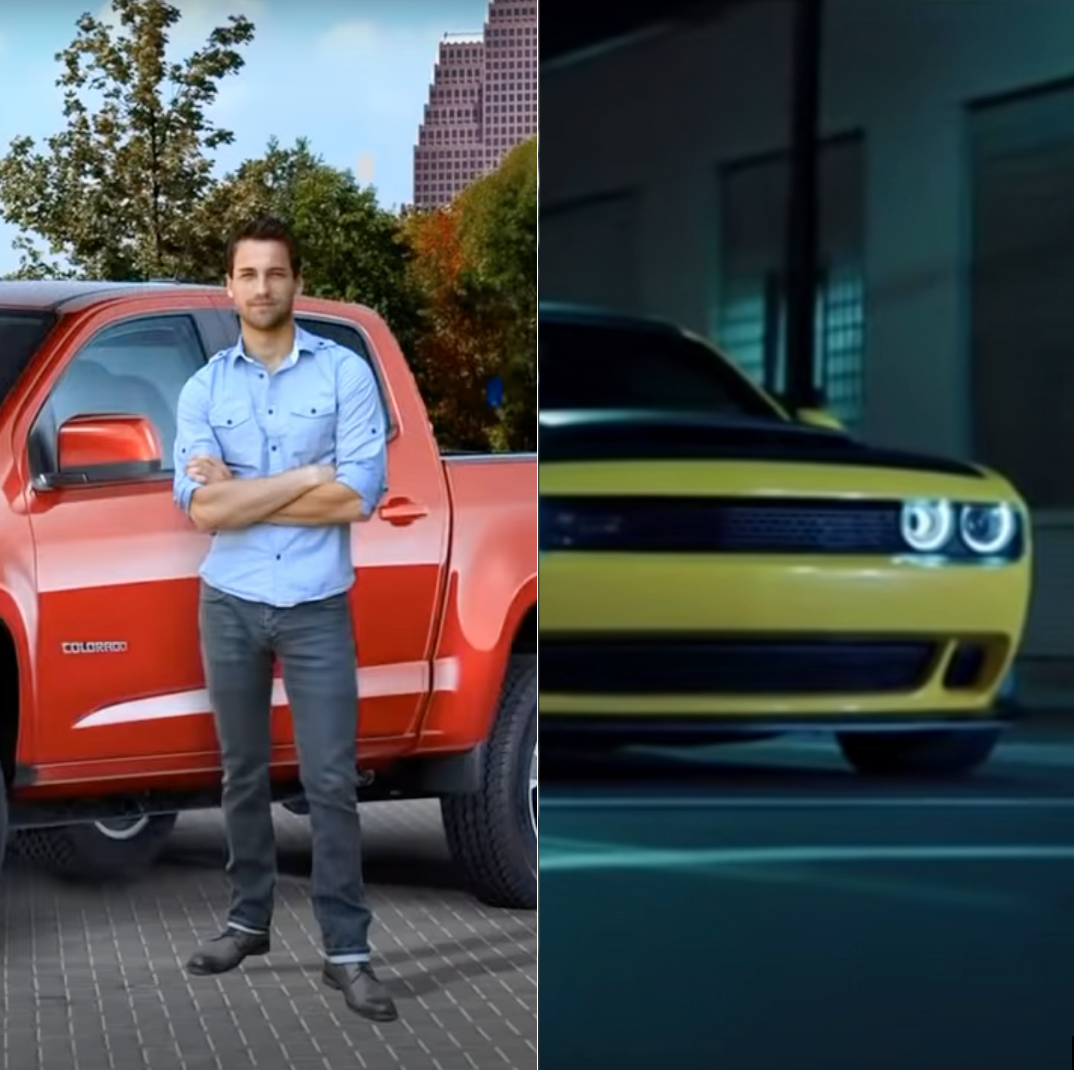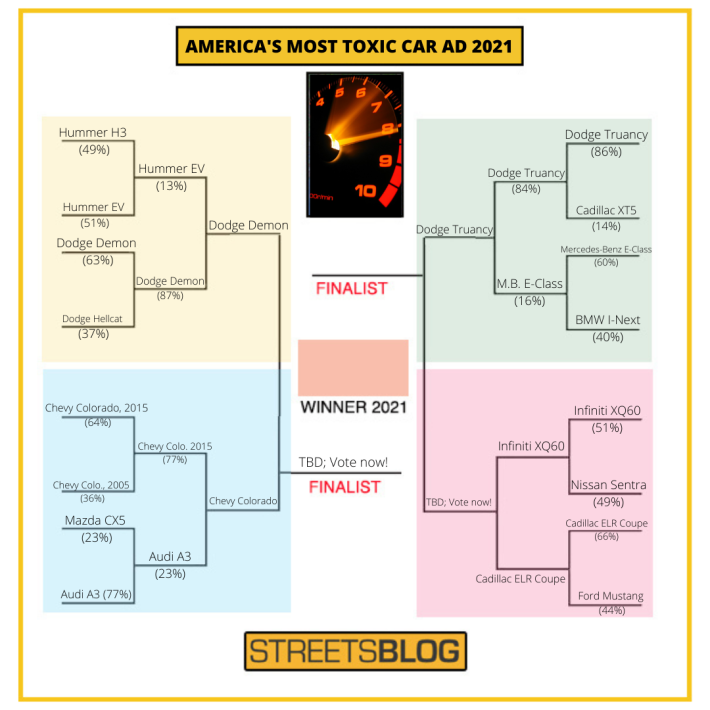Editor's Note: This article is the first semi-final bout in our competition to find America's Most Toxic Car Ad. Don't forget to scroll to the bottom to vote, and click back to our most recent match-up between Infiniti and Cadillac to cast your ballot before polls close on Wednesday, Nov. 3 at 11:59 p.m.
We're down to the worst of the worst in our quest to find America's most toxic car ad — and it's time to talk about what to do about it.
As we move into the Final Four, we're bringing in a new guest commentator who knows a thing or two about the role that auto advertising plays in our national traffic violence crisis: Danny Harris, executive director of nationally recognized nonprofit Transportation Alternatives and author of a viral article about why "the government should regulate automobile marketing and end the glorification of speeding and reckless driving."
But even Harris was astounded by just how bad this round of ads was — and he couldn't help but connect it with the real-world roadway tragedies his organization works to prevent every day.
"Honestly, these made me even angrier during this round than when I watched them the first time," Harris said. "These automakers aren't even really selling cars; they’re inciting violence. And our regulators and our cities don’t just allow it. They celebrate it as American innovation and freedom. But it's really the opposite. It’s America at its worst."
Let's see how bad it gets — and talk a little about how to make it better.
The Chevy Colorado
This meta Chevrolet ad about a not-so-impartial focus group didn't test well with the Streetsblog audience, who gave it a stunning 77 percent of the vote over a green-washed Audi A3 spot in the quarterfinals. And as Harris points out, the competition isn't the only thing this ad is dominating — because it's basically a love letter to the idea of domination itself.
"I’m a parent of young children, and when their teachers talk to them about bullying in school, this is literally what they talk about," Harris said. "All this stuff about 'the guy with the sedan is less handsome' and the 'guy with the truck looks like he'd have a cooler pet' — it's all about making people feel bad who don't or can't buy a truck."
Of course, would-be car buyers soon may not have much of a choice. In the years since this ad first aired in 2015, automakers across the country have discontinued most of their smallest models, causing SUV, pick-up and other light truck sales to claim an ever-larger share of the vehicle market and pedestrian deaths to skyrocket in their wake.
Not coincidentally, a 2019 Morgan Stanley Research study found that Chevy's parent company, General Motors, made 80 percent of its revenue from just five models — all of which were classified as light trucks — while the company often lost money on smaller, safer models. Actively discouraging consumers from buying more sensible options through ads like this may have been cheaper than finding ways to bring down the overhead on their sedan portfolio, even though this ad aired as an ultra-expensive Superbowl spot.
Harris says leaders could be doing more to reverse those toxic trends — and that not just at the federal level.
"Cities could do so much just with procurement, by setting mandates that X percent of city-owned fleets have to be sedans," Harris said. "They could charge people more to park bigger vehicles in city-owned spaces. Or they could even ban SUVs and light trucks from cities all together."
Short of that, Harris has a helpful suggestion for the Chevrolet team if they want to make a commercial that more realistically demonstrates what could happen if they buy a big car: put some of the countless families who have lost loved ones to traffic violence in the focus group and see what they have to say.
"Of course, no ad agency would let a member of Families for Safe Streets into the room," Harris sighs.
The Dodge Demon
Some readers might be surprised that this ad for the all-too-literal speed Demon bested the EV Hummer in round two, never mind that it did so by an 87-point margin almost as gargantuan as the military-inspired SUV itself.
But Harris, whose viral op-ed was inspired in part by Dodge's notoriously awful ad sets, wasn't quite so shocked.
"Automotive ads are generally really bad, but Dodge is, above and beyond, worse than any other car company," said Harris. "There’s not even a hint that a speed limit even exists, much less that a driver might abide by one. They’re inciting road violence in every single one of their commercials."
Harris isn't exaggerating when he says that the ad execs behind the Chrysler brand have blood on their hands. A 2010 Australian study found that exposing drivers to ads that feature aggressive driving actually causes aggressive driving — eight years after automakers adopted a voluntary code that prevented them from showing drivers breaking traffic laws in commercials.
The U.S. doesn't have such a pact, which is why Dodge can feature a motorist stylized like a leather-gloved serial killer breaking the sound barrier on a city street.
But Harris says that automakers could be made to do better than that tiny, illegible disclaimer text at the bottom of the screen warning consumers not to attempt these stunts in real life — even if automakers themselves don't step up to the plate.
"We’ve actually seen a lot of progress in other countries that have regulated these types of aggressive ads," Harris said. "I think there’s certainly a precedent for the Federal Trade Commission to do something; look at the regulations we have around the advertising of pharmaceuticals, cigarettes, gambling, guns; there are simply more ways that the government could be stepping in — and ideally, regulating the vehicles themselves, too."
Until that happens, though: let's vote.
Polls will be open until Wednesday, Nov. 3 at 11:59 p.m.
[poll id="200"]
Here's the full bracket if you're following along at home.







